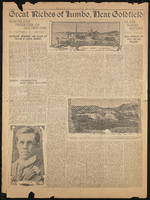Search the Special Collections and Archives Portal
Search Results
Las Vegas Jazz Society Records
Identifier
Abstract
The Las Vegas Jazz Society Records (approximately 1975-2003) are comprised of organizational records including meeting agendas, minutes, and membership statistics of the Las Vegas Jazz Society (LVJS). Included in the collection are issues of the LVJS's newsletter Jazz Notes, promotional materials, blank membership applications, correspondence, information on other regional jazz societies, and photographic prints depicting various events and festivals. A portion of this collection documents LVJS's involvement in saving the KUNV 91.5 FM radio station.
Archival Collection
Hal Rothman Faculty Papers
Identifier
Abstract
The Hal Rothman Faculty Papers (approximately 1930-2006) are comprised primarily of research, teaching, and professional papers of Hal Rothman, professor of history at the University of Nevada, Las Vegas (UNLV). The papers include Rothman's research notes, manuscript drafts, conference articles, lecture notes, audiovisual material for his book
Archival Collection
Phillip L. Cook oral history interview
Identifier
Abstract
Oral history interview with Phillip L. Cook conducted by Richard Strahan on March 3, 1977 for the Ralph Roske Oral History Project on Early Las Vegas. Cook first talks about his parents' move to Nevada and discusses how the school system has changed over time. He then describes the first businesses that opened up in the Downtown and Strip areas of Las Vegas, Nevada before discussing prostitution, Block 16, and recreational activities available to youth. Cook also talks about the first television sets and telephone systems made available, and he moves on to talk about the prices of things such as movies and haircuts when he was younger. The interview then moves to discussions on the Old Ranch, racial discrimination, school integration, the crime rate, and the school system in Las Vegas.
Archival Collection

Arturo Ochoa interview, April 9, 2019: transcript
Date
Archival Collection
Description
On the corner of Eastern and Stewart, inside the East Las Vegas Community Center, lies an oasis of creativity and art. The halls ring with the sound of harmonious music coming from the meeting rooms, where children move violin bows up and down in a synchronized motion. They stare with concentration at the music sheets in front of them. They gracefully play together and fill the empty halls with classical music. For most of them, they are the first in their family to learn how to play an instrument. Like many in their neighborhood, they are also first-generation Americans. The students are rehearsing for their recital with the Las Vegas Philharmonic at the Smith Center in a few weeks. In the back of the room there is a man gleaming with pride and joy. The Foundation to Assist Young Musicians (FAYM) provides the rehearsal space, violins, and music lessons at the community center and allows these children to flourish despite their economic, social, or racial background through, “Building
Text
Wolff, Walter P., 1928-2016
http://www.ladailypost.com/content/obituary-walter-p-wolff-dec-29-2016
copied from resouce above
Person
Von Tobel Family Papers
Identifier
Abstract
The Von Tobel Family Papers (1905-1997) consist of photographs, correspondence, and financial reports pertaining to the early Las Vegas Von Tobel family and their businesses, which they operated in Las Vegas, Nevada. The collection also contains newspaper clippings covering the life of Edward Von Tobel Sr. and some of the operational business records of the Von Tobel Hardware Store No. 301.
Archival Collection
Sherwin "Scoop" Garside Papers
Identifier
Abstract
The Sherwin "Scoop" Garside Papers comprise photographs and documents of Las Vegas Review-Journal writer and photographer Scoop Garside. The collection dates from 1930 to 1983 and includes publicity photos of the Old Spanish Trail, correspondence from the Nevada State Centennial Commission, history of mines (Tonopah, Goldfield, Bullfrog), copies of articles written by Garside, family photos and general photographs of people and places, negatives of Las Vegas, Nevada; Searchlight, Nevada; St. George, Utah; and several unlabeled negatives. The 2017 addition contains newspaper clippings, a scrapbook, Nevada Historical Quarterly, and information on Nevada historic preservation. There is also genealogical information on the Garside family.
Archival Collection
Baneberry Nuclear Test Trial Records
Identifier
Abstract
The Baneberry Nuclear Test Trial Records (1969-1989) contain documents of a federal court case regarding a 1970 Nevada Test Site nuclear test and the resultant radioactive cloud which may have exposed and subsequently injured the test site workers. The consolidated suits, William Nunamaker vs. the United States and Harley Roberts vs. the United States, came to trial January 1979, in Federal District Court, Las Vegas, U.S. District Judge Roger Foley presiding. The materials in the collection consist of court documents, such as transcripts of the trial, briefs, findings and statements, an appeal, orders, defense and plaintiff exhibits, and indices to the exhibits and witnesses as well as a glossary of terms.
Archival Collection
Las Vegas Ambassadors Collection
Identifier
Abstract
The Las Vegas Ambassadors Collection (1968-1985) primarily consists of a scrapbook, newspaper articles, and photographs documenting the activities of the Las Vegas Ambassadors youth singing group. The materials were compiled by Harry LaFavor, the Ambassadors' business manager, who co-founded the group with Norman Kaye and Richie Astone to promote a positive image of Las Vegas. The collection also includes a songbook, vinyl record and ¼” tape recording, and promotional materials.
Archival Collection

